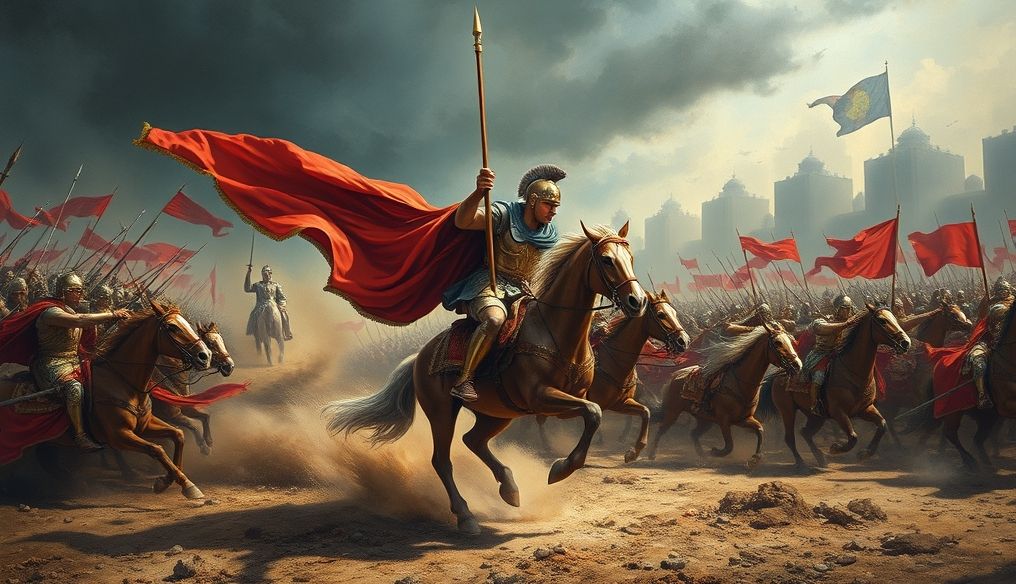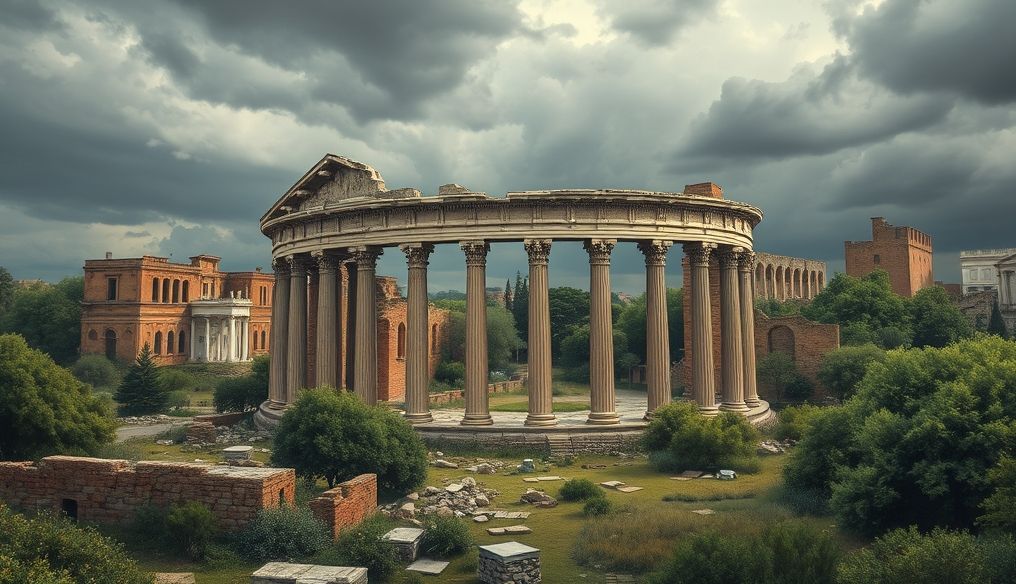Who Was Alexander the Great?
Alexander III of Macedon, known as Alexander the Great (356-323 BC), was a Greek king of Macedon. He is considered one of the greatest military commanders in history, having established a vast empire stretching from Greece to northwestern India. He led his army in a series of successful campaigns in which he was never defeated, making him a legend in his lifetime.
His Upbringing and Education
Alexander was born in Pella, the capital of the Kingdom of Macedon. His father was King Philip II, who united most of the Greek cities under his rule. His mother was Olympias, daughter of King Neoptolemus I of Epirus. Alexander was educated by the philosopher Aristotle, who instilled in him a love of knowledge, science, and philosophy.
From a young age, Alexander showed signs of intelligence and courage. He was skilled in horsemanship and combat and dreamed of surpassing his father's achievements and expanding the Macedonian Empire.
Historical Background: Macedon Before Alexander
Before Alexander, Macedon was a powerful kingdom but not dominant over all of Greece. King Philip II, Alexander's father, united most of the Greek cities by force and diplomacy, and established a strong and organized army. This army would later be used by Alexander in his conquests.
Philip II's Military Reforms
- Formation of Macedonian Phalanxes: These were highly trained heavy infantry units equipped with long spears (sarissas).
- Use of Heavy Cavalry: Cavalry played a crucial role in the battles of Philip and Alexander.
- Development of Siege Warfare: Philip used advanced techniques to besiege cities, allowing him to capture them quickly and effectively.
The Beginning of Alexander's Reign and Consolidation of Power
After the assassination of King Philip II in 336 BC, Alexander took the throne at the age of twenty. Alexander faced significant challenges at the beginning of his reign, as some Greek cities revolted against Macedonian rule. Alexander quickly and brutally suppressed these revolts, demonstrating his determination to maintain the unity of the empire.
The Balkan Campaign
After consolidating his power in Greece, Alexander led a military campaign into the Balkans, where he subdued the rebellious tribes and secured the northern borders of the empire.
The Eastern Campaign: Conquest of the Persian Empire
In 334 BC, Alexander began his Eastern campaign, which aimed to conquer the Persian Empire, the largest and richest empire in the world at that time. Alexander led his army across Asia Minor and defeated the Persian army in decisive battles such as the Battle of the Granicus River and the Battle of Issus.
Battle of the Granicus River (334 BC)
This battle was the first major encounter between Alexander and the Persian army. Alexander achieved a resounding victory, opening the way to Asia Minor.
Battle of Issus (333 BC)
In this battle, Alexander defeated the Persian King Darius III in person. Darius fled the battlefield, leading to the collapse of the Persian army.
After the Battle of Issus, Alexander captured the Phoenician coastal cities, such as Tyre and Sidon, to prevent the Persian navy from using them as a base for its operations.
Conquest of Egypt and Founding of Alexandria
In 332 BC, Alexander conquered Egypt, which was under Persian rule. The Egyptians welcomed Alexander as a liberator and crowned him pharaoh. Alexander founded the city of Alexandria, which later became an important cultural and scientific center.
Alexander visited the Temple of Amun in the Siwa Oasis, where the priests declared him the son of the god Amun.
Penetration into the Heart of the Persian Empire
After the conquest of Egypt, Alexander continued his Eastern campaign and penetrated into the heart of the Persian Empire. Alexander defeated Darius III again at the Battle of Gaugamela in 331 BC. After this battle, the major Persian cities, such as Babylon, Susa, and Persepolis, fell into Alexander's hands.
Battle of Gaugamela (331 BC)
This decisive battle marked the end of the Persian Empire. Alexander defeated a massive Persian army led by Darius III and captured the Persian capital, Persepolis.
After the fall of Persepolis, Alexander ordered the burning of the royal palace, a move that sparked widespread controversy among historians. Some believe that Alexander did this in retaliation for the Persians' destruction of the Acropolis in Athens during the Persian Wars.
The Indian Campaign and Return
After the conquest of the Persian Empire, Alexander continued his campaign eastward and conquered parts of India. Alexander faced fierce resistance from the Indian kingdoms, but he managed to defeat them in battles such as the Battle of the Hydaspes in 326 BC.
Battle of the Hydaspes (326 BC)
In this battle, Alexander defeated the Indian King Porus, who resisted bravely. Alexander was impressed by Porus's courage and restored him to his throne as an ally.
After the Battle of the Hydaspes, Alexander decided to return to Babylon due to the exhaustion of his army and the length of the campaign.
Death of Alexander and Division of the Empire
Alexander died in Babylon in 323 BC, at the age of 32. The cause of his death is unclear, but some believe that he died of fever or poisoning.
After Alexander's death, his empire was divided among his generals, who established independent Hellenistic kingdoms. Among these kingdoms were the Ptolemaic Kingdom in Egypt, the Seleucid Empire in Asia, and the Antigonid dynasty in Macedon.
Legacy of Alexander the Great
Alexander the Great left a lasting legacy in history. He had a significant impact on the culture, politics, and economy of the ancient world. His conquests contributed to the spread of Greek culture throughout the Middle East and Central Asia, leading to the emergence of Hellenistic civilization.
His Influence on Culture
- Spread of the Greek Language: The Greek language became a common language throughout the Alexandrian Empire, contributing to the spread of Greek culture.
- Founding of Hellenistic Cities: Alexander founded many new cities throughout his empire, which became important cultural and scientific centers.
- Cultural Exchange: Alexander's conquests contributed to the exchange of ideas and knowledge between East and West.
His Influence on Politics
- Establishment of Hellenistic Kingdoms: After Alexander's death, his empire was divided among his generals, who established independent Hellenistic kingdoms.
- Influence on Subsequent Empires: Many subsequent empires, such as the Roman Empire, were inspired by Alexander's achievements.
His Influence on the Economy
- Expansion of Trade: Alexander's conquests contributed to the expansion of trade between East and West.
- Unification of Currency: Alexander unified the currency throughout his empire, facilitating trade.
Military Strategies Used by Alexander
Alexander the Great was distinguished by exceptional military skills, making him one of the greatest military leaders in history. Alexander used a variety of successful military strategies, including:
- Speed and Surprise: Alexander preferred to launch quick and surprise attacks on his enemies, confusing them and preventing them from preparing.
- Flexibility and Adaptation: Alexander was able to adapt to changing conditions on the battlefield and change his plans as needed.
- Use of Terrain: Alexander was skilled at using terrain to his advantage, choosing battle locations that gave him an advantage over his enemies.
- Morale: Alexander was able to raise the morale of his soldiers and motivate them to fight bravely.
Lessons Learned from the Life of Alexander the Great
We can draw many lessons from the life of Alexander the Great, including:
- Ambition and Vision: Alexander had great ambition and a clear vision, which drove him to achieve great accomplishments.
- Leadership and Courage: Alexander was a courageous and inspiring leader, able to lead his soldiers to victory.
- Learning and Adaptation: Alexander was keen to learn and adapt to changing circumstances, which helped him succeed in various situations.
- Resilience and Perseverance: Alexander faced many challenges and difficulties, but he never gave up and continued to persevere until he achieved his goals.
In conclusion, Alexander the Great remains a controversial and admired historical figure. His military, political, and cultural achievements continue to inspire us today.




